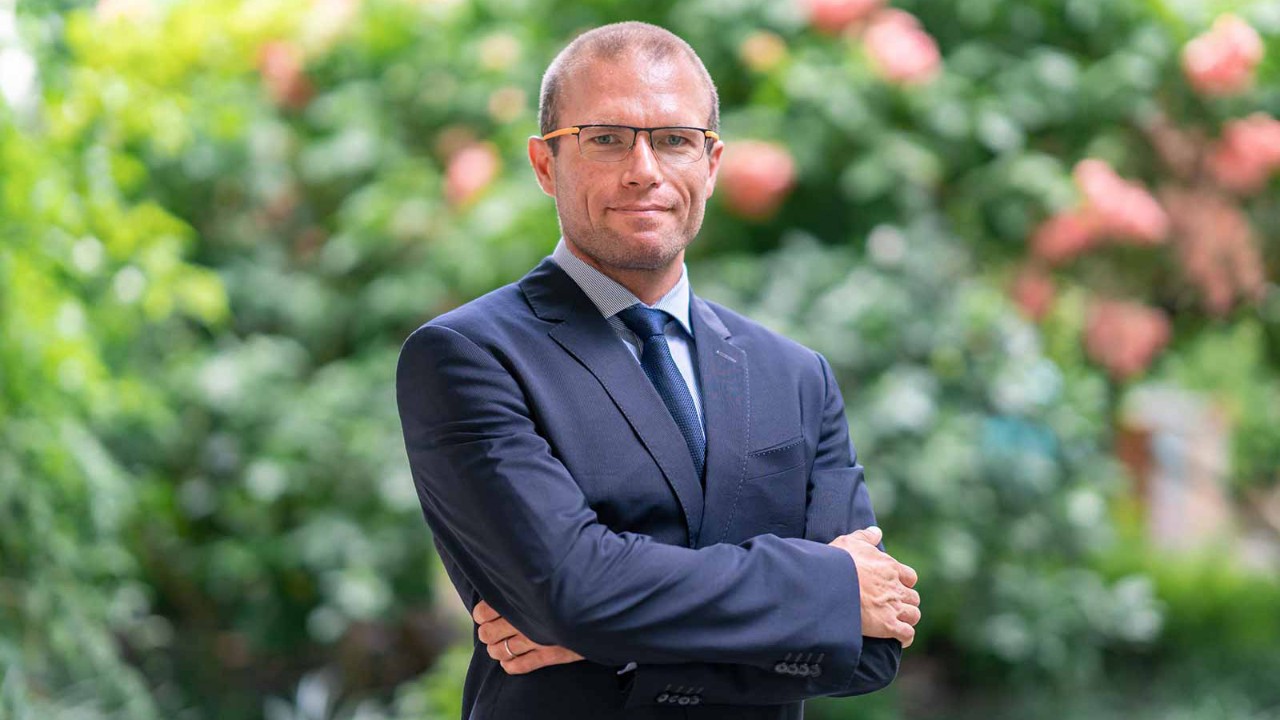
An economics graduate, Walker began his professional career in the UK as an audit trainee. ‘I was attracted by a keen interest in understanding how businesses operate and perform, which is an insight that an effective audit provides,’ he explains. He chose the ACCA Qualification because of its international recognition.
Four years into his career, Walker used that international recognition to relocate from London to the Cayman Islands. ‘After a family holiday in the Caribbean, I decided to relocate to Grand Cayman to take up a role at Grant Thornton. Cayman is the most developed and affluent of the Caribbean islands, and the world’s leading domicile for regulated investment funds, which are the focus of most audit firms here.’
‘Public blockchain-based transactions can offer near real-time gross settlement in markets that never close’
CV
2021
Decentralized Finance (MOOC), University of California, Berkeley
2019
Digital currency MSc, University of Nicosia
2008
Managing partner, Moore Cayman (formerly Kinetic Partners)
2002
Audit manager, Grant Thornton Cayman Islands
2002
ACCA membership
2001
Audit manager, Kench & Co, Oxfordshire, UK
1998
Accountant, Harwood Hutton, London
After six years with Grant Thornton and obtaining an audit practitioner license in 2008, he took the opportunity to lead the Cayman audit practice of Kinetic Partners, which later became Moore Cayman, a member of the Moore Global network. Under Walker’s leadership as managing partner, the firm has expanded, achieving particularly strong recent success – growing by over 100% in the past 12 months alone. Once newly recruited staff come on board, the firm will have a dedicated team of 45 auditors and trainees across its Cayman and London offices.
A key reason for Moore Cayman’s recent growth is its capability in digital asset audits. ‘In 2016 we started the steep learning curve ahead of launching our digital asset audit services in 2017,’ Walker says.
About 200 of the firm’s current clients are focused on digital assets, with most being regulated investment funds in the Cayman Islands or British Virgin Islands. ‘We also serve a number of well-known virtual asset service providers and blockchain software companies,’ Walker says. ‘Among our clients is Tether, a stablecoin pegged to the US dollar and the world’s leading digital currency by daily transaction volume.’ Stablecoins are cryptocurrencies whose price is pegged to another cryptocurrency, fiat money or an exchange-traded commodity.
Unprecedented transparency
The new technology offers exciting opportunities in the financial space. Walker says that public blockchains can bring unprecedented transparency and accuracy to financial transactions, and that the blockchain itself can be far more robust (not only resistant to shocks and stresses but stronger because of them) and secure (not prey to viruses, malware or phishing) than traditional financial transactions. ‘In addition, public blockchain based transactions can offer near real-time gross settlement in markets that never close, with unparalleled robustness, security and transparency, lower costs and none of the frustration of a missing wire transfer.’
Walker hails the advent of successful decentralised and disinflationary cryptocurrencies, which can potentially better align the economic incentives of users (including government) with those of the economy. ‘At a time when the depressed velocity of fiat currencies has raised worldwide concerns and cannot be measured in an accurate or timely manner, it is incredible to see the explosive velocity and growth of stablecoins – precisely observable in real time by anyone with internet access. The potential benefits for international trade and the remittance industry are unquestionable.’
The digital asset space presents plenty of challenges for professionals. ‘The key challenge is the rapidly evolving regulatory framework,’ Walker says. ‘Cryptocurrency transactions can be borderless, and digital asset businesses have to stay on top of the evolving regulatory framework of each of the relevant regulators in each country in which they transact.’
Pace of innovation
Walker describes the pace of innovation in the decentralised finance industry as ‘truly phenomenal’. He explains: ‘With liquidity pools, staking rewards and governance tokens, there are new industry developments every day. One particular challenge is the accounting software needed to accurately track and report decentralised finance transactions given that there are now about 12,000 different digital assets being traded.’
Alongside challenge comes opportunity. In June this year, Moore Cayman launched the first verification service for its audit clients through a public blockchain. The service allows recipients of audited financial statements to independently verify they are valid original copies signed by Moore Cayman via a decentralised blockchain application.
Moore Cayman records a secure hash algorithm of the audited financial statements of clients that use this service on a public blockchain. All recipients of the audit documents can then follow a real-time verification process that eliminates manual checks or reliance on a third party to provide valid copies.
‘Throughout the process no confidential information is revealed because only the privacy preserving “fingerprint” or hash of financial statements signed by Moore Cayman is appended to the public blockchain,’ Walker explains.
‘The potential benefits for international trade and the remittance industry are unquestionable’
Tips
‘While the regulation of digital assets faces many nuanced approaches by various national and state regulatory bodies, it is clear that regulation will only increase. As regulation increases, I expect growing demand for cryptocurrency-focused investment funds.’
‘Continual learning is key to cater for the incredible pace of innovation in the digital asset industry, yet there are opportunities for diverse backgrounds with increasing demand for accountants, auditors as well as software engineers, lawyers, regulatory and compliance specialists, plus economists.’
Any recipient of the audited financial statements can use the transparency of the relevant public blockchain to check that their copy has not been tampered with, that Moore Cayman signed the audit report, and that the statements were signed in a transaction using a public address declared by Moore Cayman on a public blockchain on the date the audit report was signed. ‘Critically, it will also be possible to check that audited financial statements have not been revoked, which adds additional real-time insight to the user,’ Walker says.
‘We have had great feedback and uptake from our clients,’ Walker adds. About 30 digital asset investment funds have now opted for the service, which has no additional cost.
Monetary sovereignty
Walker believes that central bank digital currencies and stablecoins have much to offer, especially for countries that lack full monetary sovereignty. ‘It is interesting to wonder how many central bank digital currencies will be needed in the world, and whether there be a first-mover advantage in building a dominant network effect, like bitcoin,’ he says. ‘El Salvador seems to be going further by giving bitcoin status as legal tender.’ The International Monetary Fund has warned against countries in general using cryptocurrencies as legal tender in case this threatens macroeconomic stability and financial integrity.
Walker is watching developments closely. ‘I hope the competition between digital assets can be healthy and lead to a more accessible, equitable and innovative financial services,’ he says. ‘I can already see a time in the future where we have to explain to a younger generation why physical cash lasted so long.’
Moore Cayman in numbers
100%+
Growth in past 12 months
Around 200
Clients focused on the digital asset industry
US$68bn
Largest clients’ assets under management




